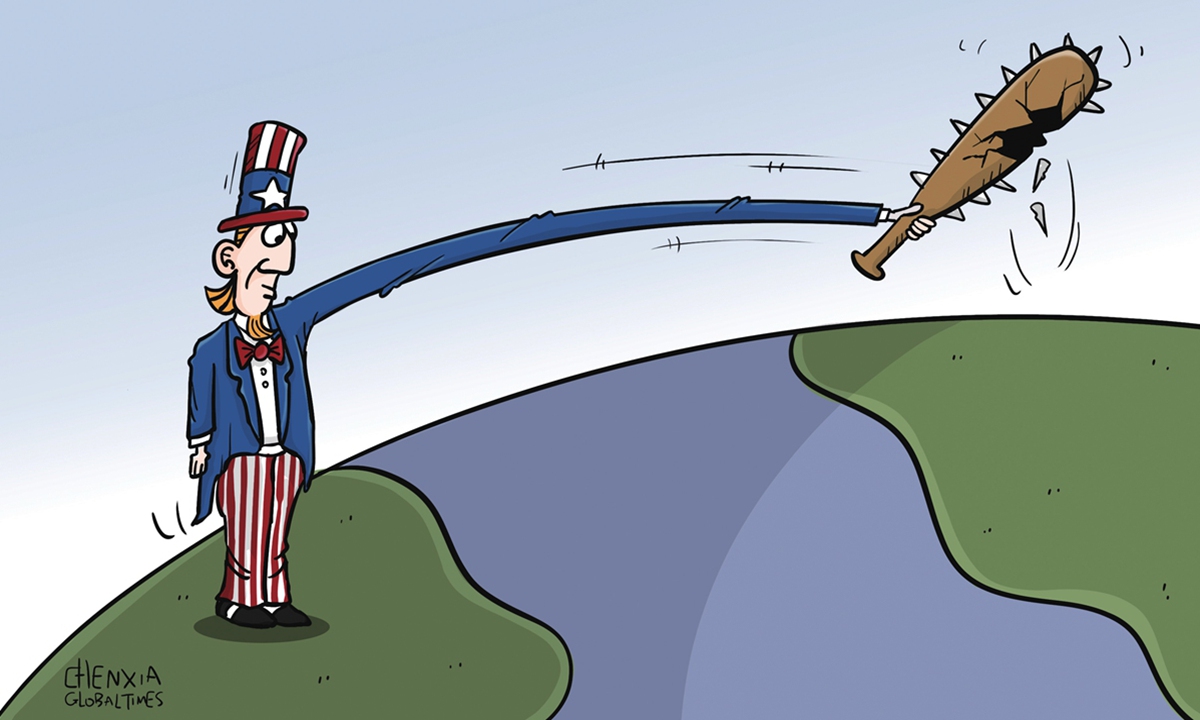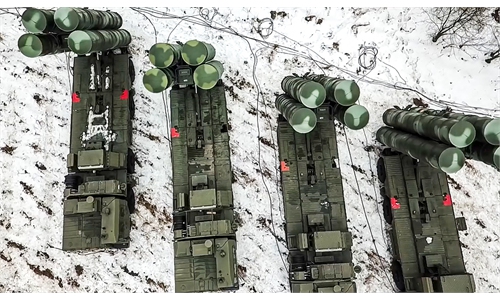
Ilustration: Chen Xia/GT
Click here to stay tuned with our live updates on Ukraine tensions.The US and its allies have imposed unprecedented economic and financial sanctions on Russia after Russian troops rolled into Ukraine. President Biden on Tuesday announced to ban Russian oil and other energy imports to the US.
Some experts argue that such sanctions are not enough to force Russia to change its strategic response to NATO's eastwards enlargement and could backfire. The more important question is why Washington is willing to use such tactics to strike or deter "hostile targets." Clearly the US has more important things to defend than oil prices.
Most of the sanctions imposed by the US and the West since the Cold War were not able to get the sanctioned state to change practices, yet the US continues to use sanctions as primary options for striking or deterring hostile forces. This is not to say that Washington does not understand counterproductive effects, but rather that sanctions have become its most easily applied economic weapon that can be used to strengthen US dominance of the global political, economic and financial system. The use of this weapon has a more lasting strategic impact on the world order.
In his book The Economic Weapon, Nicholas Mulder, assistant professor of history at Cornell University in New York, writes that sanctions are on the rise as a tool of modern warfare, yet in the long run, "commodity control was not where Washington's advantage was greatest. Its hegemony derived less from goods trade than from international leadership in corporate, regulatory, technological and financial structures - an ensemble of capacities that policymakers have come to see as tools of 'economic statecraft.'"
The sanctions against Russia initiated by the US and its allies since 2014, when the Russia and Ukraine conflict emerged, were not designed to bring Russia down immediately, but severely weakened Russia's ability to participate in the Western-dominated financial/trade system. They forced Russia to become increasingly disconnected from high-end technology and more dependent on energy and raw material exports.
The sanctions strengthened the Western front line and consolidated the commonality of values to counter any challenger to the system.
In an article titled "A Western Strategy for a Declining Russia" (September 3, 2014), American scholar Joseph Nye writes that, "a century ago, the decline of the Austro-Hungarian and Ottoman Empires proved highly disruptive to the international system. A gradual decline, like that of ancient Rome or eighteenth-century Spain, is less disruptive than a rapid one, but ultimately the best scenario would feature a recovering and rebalanced Russia over the next decade."
While Russia's energy exports can earn it significant foreign exchange, without the support of a diversified economic structure, Russia's weight in the global economy will continue to shrink and will be vulnerable. The impact will be lasting.
Some US experts have long argued that comprehensive US sanctions against the Soviet bloc during the Cold War served to dismantle the former Soviet Union. In the process, the rules established during the Cold War eventually led to the formation of a Western-dominated financial and economic trading system. Any outside country had to first join and abide by its rules in order to participate in the division of labor system that eventually led to the further consolidation of US hegemony.
Economic and financial dominance is a hegemonic force, potentially as strong as a military hegemony. This time, for example, the US and its allies froze the Russian Central Bank's access to much of its $630 billion in foreign exchange reserves.
One of the goals of the economic and financial sanctions imposed by the US is to continuously push the target country to the margins of globalization, reducing its ability to benefit from and access the global economic, financial, and trade systems, making the target country less influential in global politics and economy.
The key to understanding US sanctions is to see that they are a demonstration of hegemonic instincts that cannot be defused through rational competition or otherwise.
They demonstrate the irrationality of the existing international political, economic and financial system. While consolidating the alliance of Western capital forces and ensuring the maximization of Western interests, they reinforce the hierarchy of global development and continue to weave hostility into the globalization process.
The author is a senior editor with People's Daily, and currently a senior fellow with the Chongyang Institute for Financial Studies at Renmin University of China. dinggang@globaltimes.com.cn. Follow him on Twitter @dinggangchina




